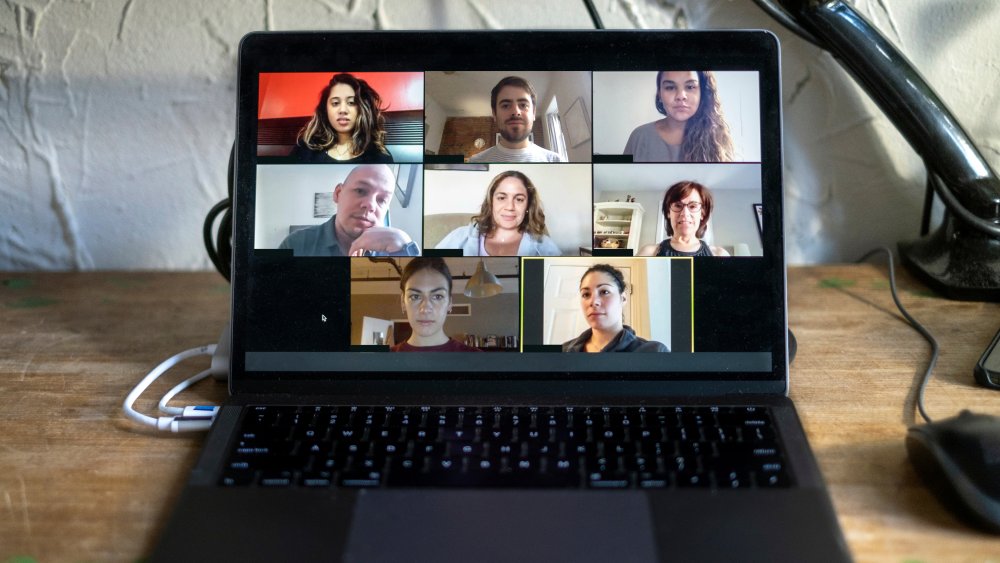The Reason You Feel So Conflicted Saying No To Zoom Calls
Zoom has been a lifeline for our work and social lives since lockdowns and social distancing began. To a certain extent, we've all become Truman Burbank on the The Truman Show, where parts of our lives now play out on-screen, and it's not surprising that after a few weeks of this, we're tired of being present and on camera for most of our time. You'd think that switching off and saying no to a Zoom call here or there could present the perfect solution. Unfortunately, as with all things in life, nothing in life is as simple as it seems.
Because we're at home, it's difficult to find excuses to skip a Zoom call. As writer Mirel Zaman points out for Refinery29, the ease of joining a Zoom call makes it easy to do, and difficult to walk away from as a result. There is a deep sense of guilt that kicks in when we say no to connecting with friends and family. And along with the sense of guilt, there is perhaps a sense of uncertainty, that we could be missing out on something big if we don't take that video call. In short, Zoom and video conferencing have given us a new way to experience FOMO (fear of missing out).
Saying no to a Zoom call can lead to FOMO
Scientists have an explanation for FOMO: The experience is considered to be a worry that other people might be having rewarding experiences while we're not. As a result, those of us who experience FOMO need to stay connected all the time, so they don't miss out on what other people are doing. FOMO has been directly linked with social media, because its dual nature allows us to know what those we love are doing online or offline, while showing us options we cannot realistically pursue (via ScienceDirect).
FOMO can be triggered by seeing screenshots of friends' video calls, which can lead to feelings of loneliness and jealousy. Some people also say that self-isolating has them feeling left out, because other friends may be physically together and doing things together, which can strengthen their bonds in the process. Psychotherapist and author Dr. Aaron Balick says feeling FOMO in insolation is completely natural, because there is an innate, human wish to be a part of a group. As such, people shouldn't feel guilty about wanting to be a part of something bigger. "During social isolation the need to be included and feel belonging in a group is increased. With people more dependent on social media for social interaction, it may be that feelings of FOMO are currently increasing rather than decreasing — even if one is missing out on a virtual event," Balick told Paper.
The guilt could be driven by fear that you'll lose your place among your friends
Sage Grazer, co-founder of digital mental health company Frame, agrees. She told Refinery29, "That fear that others are bonding without you is tied to the fear that you will ultimately lose your place in the group, which as social creatures, threatens your survival. While it might seem silly to feel left out of a virtual hangout, it touches on the primal fear of losing your place in the herd, which strikes a nerve with our survival instincts as a species that is generally interdependent."
So don't feel conflicted the next time you think about skipping a Zoom call, because it does involve a binary decision. You could swallow your FOMO, just say no, and hang out with your significant other/pet/family and chill, or you could suck it and join the video call. You might have Zoom fatigue afterward, but at least you'll be all caught up. The good news is, you're likely feeling what everyone else on the call is feeling.


